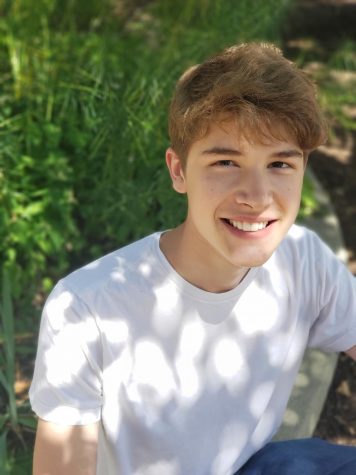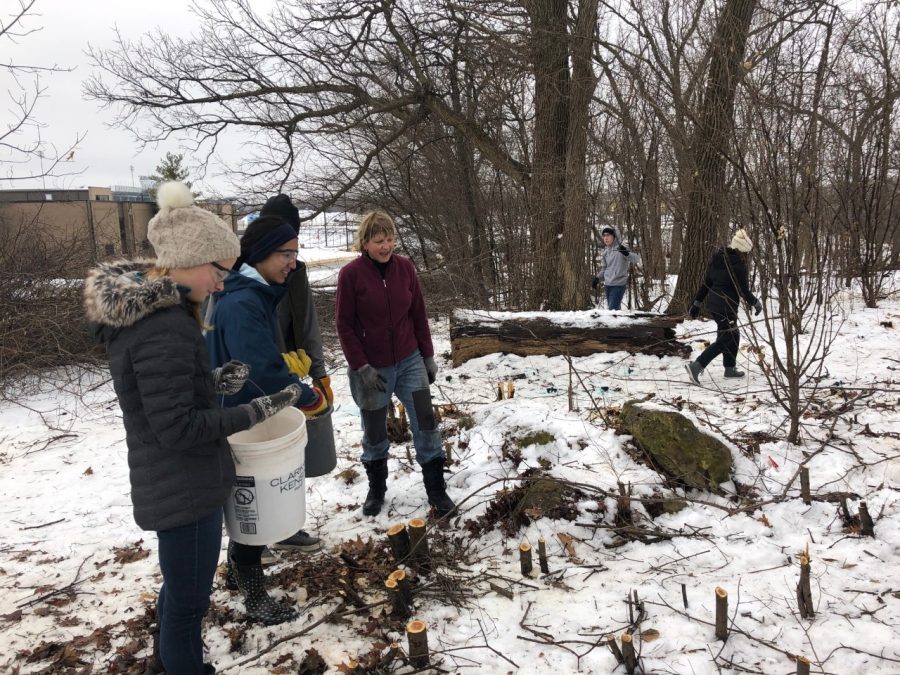Leaving a legacy
REACT club recieves award for restoration project
Photo by and used with permission of Judi Thode.
REACT club members spread seeds for native grasses with the guidance of Ancient Oaks, a community environmental group. Spreading seeds was just one part of the project, however, as it also included cutting buckthorn and clearing other invasive species, Paige Orals, 2020 graduate, says.
The REACT club is receiving recognition for their efforts to clear invasive species from the oak woodland near the student parking lot; a process that took the group over two months.
The Barrington Area Conservation Trust bestowed the “Conservation at School” award for “conscientiously improving the natural world for wildlife and humanity at school,” according to Susan Lenz, Executive Director of Conservation of the Trust. Though several groups, including NHS and other community organizations, coordinated to restore the oak woodland, REACT is getting special recognition for spearheading the effort.
Lenz says the REACT project showed great promise and a lot of commitment from the members. The most exciting part of the project was “seeing future environmental stewards get out there,” Lenz said. “I was just very impressed with the collaboration between students and the support from the school.”
Part of the reason REACT’s work deserves so much praise is the nature the club preserves, says Paige Orals, 2020 graduate who led the project last year.
“Most people didn’t really recognize or know that the woodlands were even there before restoration,” Orals said. “[This project] shows the importance of nature that can be found on any property and how if you put work to preserve an area back to its native state then it’ll be a better place for animals to live, plants to thrive, and for humans to enjoy.”
Putting in that effort to restore natural areas is crucial, says Judi Thode, president of the Ancient Oaks Foundation, which helped clear the woodland. Thode says the oak woodlands are not only few in number, but the benefits they provide may disappear if the oaks are not protected.
“There are only about 13% of those [original] oak woodlands remaining in [Lake County]. So even saving a small remnant such as at the high school is important,” Thode said. “Since oaks are a keystone species here in the Midwest, when oak groves are eliminated we lose a lot of our biodiversity. When an oak woodland goes, the nearly 500 species of plants, animals, and fungi that it supports go too.”
While the REACT restoration project may have only preserved a small patch of oak woodland, it still made a big impact, Orals said.
“It’s always a good feeling to know that your efforts went towards a good cause and to be acknowledged for that. You did all this work, and [now] it’s a better environmental habitat and a better place for people to enjoy,” Orals said. “It was a big step for the REACT Club because we actually did something that’s gonna last. We left a legacy.”

As a senior, this is Max’s third year on staff and first year as magazine editor in chief for the Bear Facts program. He aspires to study environmental...

As a senior, this will be Ruby's third year on staff and first year as LZ Life Editor. When Ruby is not in the journalism room you can find her running...

